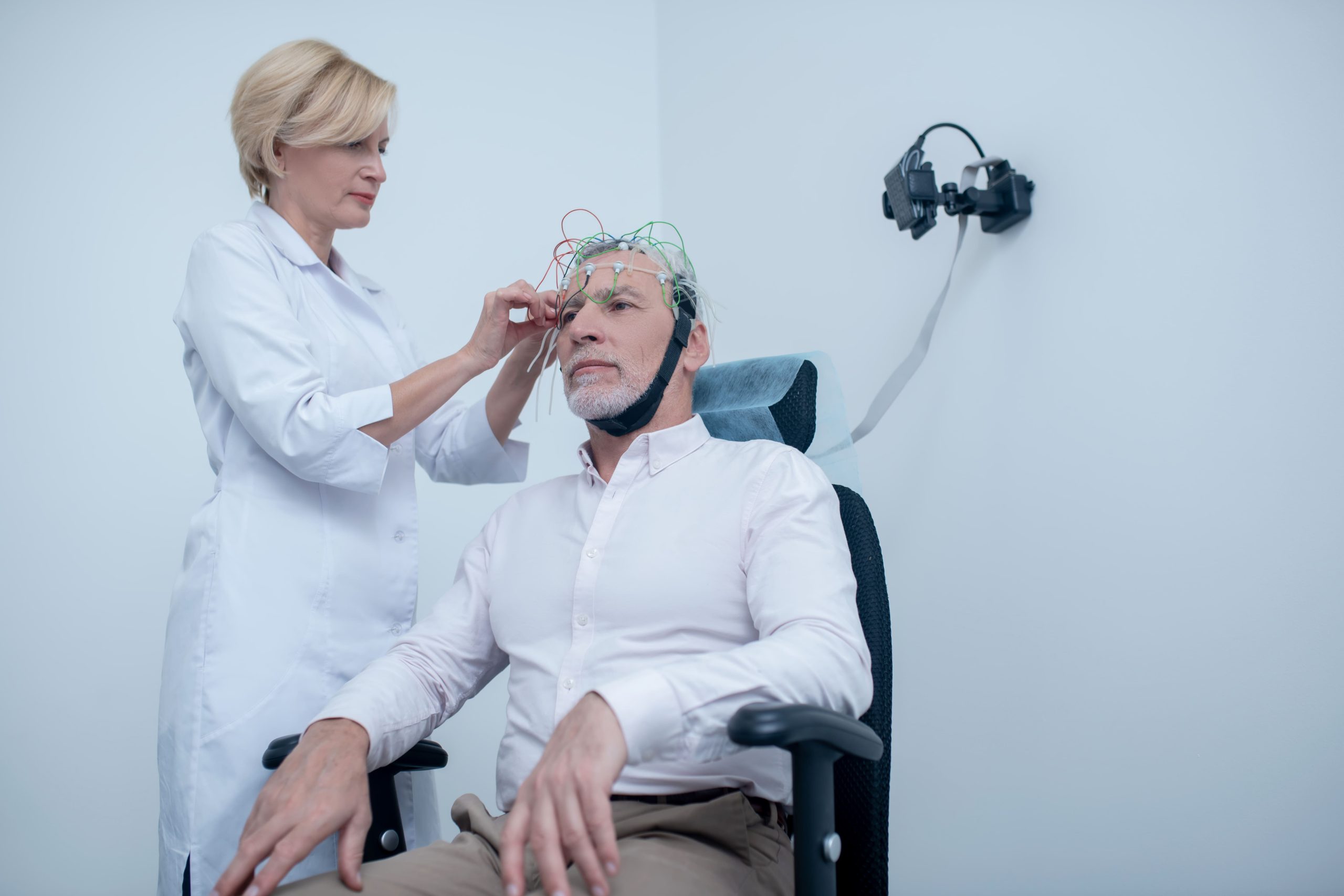Market Overview
The Saudi Arabia neurostimulators market is valued at approximately USD 40 million in 2024 with an approximated compound annual growth rate (CAGR) of 14% from 2024-2030, based on a thorough analysis of industry trends and historical data. The market is primarily driven by an increase in the prevalence of neurological disorders, along with the rising demand for advanced medical technologies that offer effective treatment solutions.
Several cities in Saudi Arabia are leading the neurostimulators market, with Riyadh, Jeddah, and Dammam being the dominant centers due to their advanced healthcare infrastructure and higher concentration of hospitals and specialized clinics. These cities attract significant healthcare investments and infrastructure development, fostering an environment that supports cutting-edge medical technology adoption. The government’s push for improved healthcare services further reinforces the dominance of these regions in the neurostimulators landscape.
Technological advancements are significantly impacting the neurostimulators market in Saudi Arabia. The introduction of next-generation devices with enhanced functionality is notable; for instance, devices using responsive stimulation technology can adjust stimulation based on patient activity levels. According to research, spending on healthcare technology in the Middle East and North Africa region is expected to reach USD 10 billion by end of 2025, indicating a shift toward innovative medical solutions. These advancements enable more effective and personalized treatment options for patients with neurological disorders, thus driving growth in the neurostimulators market.
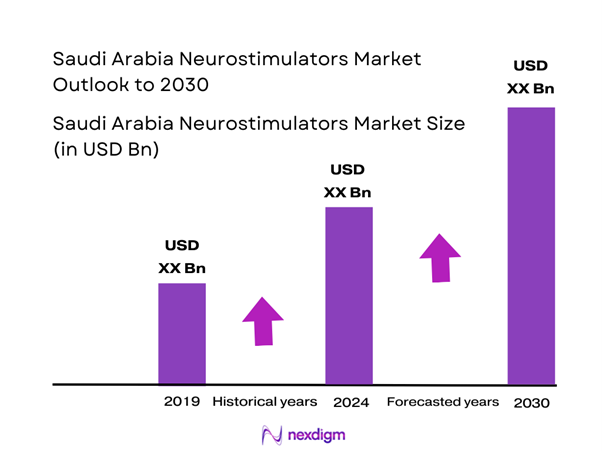
Market Segmentation
By Product Type
The Saudi Arabia neurostimulators market is segmented by product type into spinal cord stimulators, deep brain stimulators, peripheral nerve stimulators, vagus nerve stimulators, and transcranial magnetic stimulation devices. Among these, spinal cord stimulators currently hold the most significant market share. This dominance can be attributed to the widespread application of spinal cord stimulation in pain management, particularly for chronic pain conditions. Their effectiveness in alleviating pain and improving quality of life has led to increased adoption by both healthcare professionals and patients, driving growth in this particular segment.
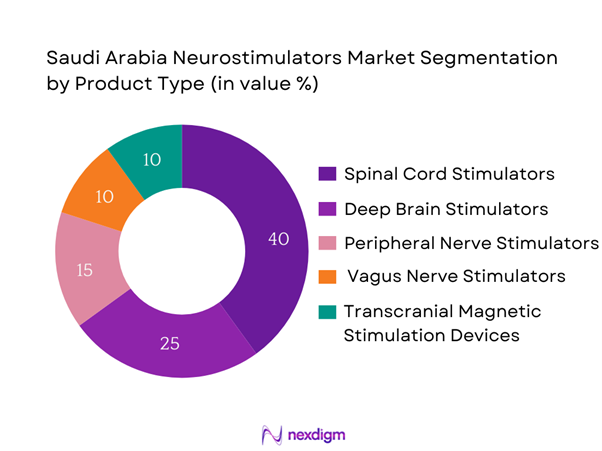
By Application
In terms of application, the market is segmented into pain management, neurological disorders, movement disorders, epilepsy, and depression. Pain management is the leading application segment, with a substantial share due to the increasing prevalence of conditions such as spinal injuries, fibromyalgia, and neuropathic pain. The effectiveness of neurostimulators in managing chronic pain has made them a preferred choice among physicians and patients alike, boosting their adoption.
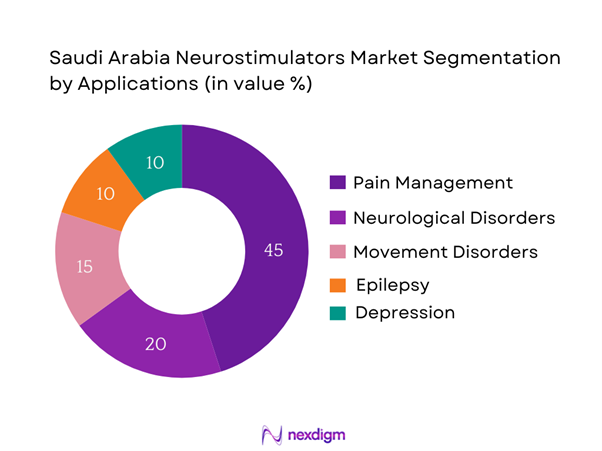
Competitive Landscape
The Saudi Arabia neurostimulators market is characterized by the presence of key players such as Medtronic, Boston Scientific, Nevro Corp, St. Jude Medical, and Abbott Laboratories. These major players hold significant market influence due to their extensive R&D capabilities and established distribution networks. Their continuous efforts in product innovation and strategic partnerships further strengthen their competitive edge in the market.
| Company Name | Establishment Year | Headquarters | Market Share (%) | Product Portfolio | R&D Budget | Recent Developments |
| Medtronic | 1949 | Minneapolis, USA | – | – | – | – |
| Boston Scientific | 1979 | Marlborough, USA | – | – | – | – |
| Nevro Corp | 2006 | Redwood City, USA | – | – | – | – |
| St. Jude Medical | 1976 | St. Paul, USA | – | – | – | – |
| Abbott Laboratories | 1888 | Abbott Park, USA | – | – | – | – |
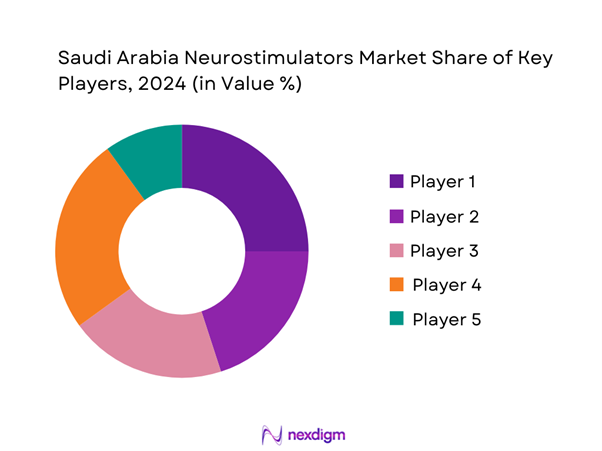
Saudi Arabia Neurostimulators Market Analysis
Growth Drivers
Increasing Prevalence of Neurological Disorders
The increasing prevalence of neurological disorders in Saudi Arabia is a crucial growth driver for the neurostimulators market. Research states that approximately 7% of the population suffers from some form of neurological disorder, including epilepsy, Parkinson’s disease, and multiple sclerosis. This number translates to nearly 2.1 million people affected, emphasizing the growing demand for effective treatment options such as neurostimulators. Furthermore, neurological conditions are a key contributor to the overall burden of disease in the country, highlighting the urgency for innovative therapies that address these growing health challenges.
Rising Geriatric Population
The geriatric population in Saudi Arabia is rising steadily, posing a notable growth factor for the neurostimulators market. By end of 2025, it is projected that 7% of the Saudi population will be aged 65 and older, which equates to approximately 2.5 million individuals. This demographic is particularly prone to neurological disorders, subsequently leading to increased demand for treatment options like neurostimulators. The Saudi government is intensifying efforts to enhance healthcare services for the elderly, ensuring access to advanced treatment modalities that cater to this aging population’s specific medical needs.
Market Challenges
High Cost of Devices
A critical challenge facing the neurostimulators market in Saudi Arabia is the high cost of neurostimulation devices. The average cost for such equipment can range between USD 30,000 to USD 50,000, making it a significant financial burden for both healthcare facilities and patients. This economic constraint limits accessibility to advanced treatments needed for managing neurological disorders, especially for lower-income populations. Furthermore, the economic climate in the region has shown fluctuations, impacting healthcare budgets and consequently the investment in expensive medical technologies like neurostimulators.
Regulatory Hurdles
Regulatory challenges pose significant barriers to the neurostimulators market in Saudi Arabia, particularly regarding the approval processes for new devices. The Saudi Food and Drug Authority (SFDA) has stringent guidelines that require comprehensive clinical trial data before approving any neurostimulation device for market use. These requirements can extend the time-to-market for new products and limit innovation. Currently, the approval process can take up to two years, hampering timely access to state-of-the-art treatments for patients suffering from neurological disorders, and negatively influencing market dynamics.
Opportunities
Growing Research and Development
The Saudi Arabia neurostimulators market has significant opportunities for growth due to the increased focus on research and development (R&D) within the healthcare sector. As of now, R&D expenditures in Saudi Arabia have reached approximately USD 850 million annually, signaling a commitment to advancing medical technology. Furthermore, the Saudi government is actively promoting partnerships between universities and medical research institutions to foster innovation. This collaborative approach is likely to yield new neurostimulation devices tailored to the specific needs of the population, thereby enhancing the overall market landscape and driving future growth.
Increasing Awareness About Neurostimulation
There is a rising awareness among both healthcare providers and patients regarding the therapeutic benefits of neurostimulation, representing a significant opportunity for market expansion. Public health campaigns elucidating the advantages of neurostimulation for treating chronic pain and neurological disorders are gaining traction. As a result, a growing number of healthcare professionals are being educated about these technologies, which in turn increases patient referrals for neurostimulator treatments.
Future Outlook
Over the next five years, the Saudi Arabia neurostimulators market is poised for robust growth, fueled by increasing consumer awareness regarding neurological treatments, ongoing technological advancements, and the government’s commitment to enhancing healthcare services. The rising prevalence of chronic pain and neurological disorders is expected to drive substantial demand for neurostimulation therapies, positioning this market for sustainable expansion.
Major Players
- Medtronic
- Boston Scientific
- Nevro Corp
- Jude Medical
- Abbott Laboratories
- Aleva Neurother
- Cyberonics
- Nuvectra
- Reflexion Medical
- Axonics Modulation Technologies
- Stryker Corporation
- Bioness Inc.
- Infinion Biopharma
- Neuronetics
- CEFALY Technology
Key Target Audience
Medical device manufacturers
Hospitals and healthcare providers
Pain management specialists
Neurologists and neurosurgeons
Government and regulatory bodies (Saudi Food and Drug Authority, Ministry of Health)
Insurance firms
Investments and venture capitalist firms
Distributors and supply chain companies
Research Methodology
Step 1: Identification of Key Variables
The initial phase involves the creation of an ecosystem map encompassing all major stakeholders within the Saudi Arabia neurostimulators market. This phase relies on extensive desk research, utilizing a blend of secondary sources such as industry reports, articles, and market databases to gather a comprehensive understanding of relevant market dynamics. The primary objective is to identify and define the critical variables influencing market behavior.
Step 2: Market Analysis and Construction
During this phase, a detailed compilation and analysis of historical data relevant to the Saudi Arabia neurostimulators market are conducted. This includes evaluating market penetration, the ratio of service providers, and the resultant revenue generation. Furthermore, an assessment of service quality metrics will be carried out to ensure that the revenue estimations are reliable and accurate.
Step 3: Hypothesis Validation and Expert Consultation
Market hypotheses will be established and subsequently validated through in-depth consultations with industry experts, utilizing variable methodologies such as computer-assisted telephone interviews (CATI) with representatives from various relevant companies. These discussions will yield valuable insights into operational and financial aspects directly from practitioners within the field, helping to refine and support the market data.
Step 4: Research Synthesis and Final Output
The concluding phase involves engaging with numerous neurostimulator manufacturers as well as healthcare professionals to acquire detailed insights on product offerings, sales performance, consumer preferences, and key trends within the market. This interaction serves to verify and complement the information gathered from the bottom-up approach, ensuring a thorough, accurate, and validated analysis of the Saudi Arabia neurostimulators market.
- Executive Summary
- Research Methodology
(Market Definitions and Assumptions, Abbreviations, Market Sizing Approach, Consolidated Research Approach, Understanding Market Potential Through In-Depth Industry Interviews, Primary Research Approach, Limitations and Future Conclusions)
- Definition and Scope
- Market Dynamics
- Timeline of Major Developments
- Business Cycle Analysis
- Supply Chain and Value Chain Analysis
- Growth Drivers
Increasing Prevalence of Neurological Disorders
Advancements in Technology
Rising Geriatric Population - Market Challenges
High Cost of Devices
Regulatory Hurdles - Opportunities
Growing Research and Development
Increasing Awareness About Neurostimulation - Trends
Shift Toward Minimally Invasive Procedures
Integration of AI in Neurostimulators - Government Regulation
Approval Processes
Compliance Standards - SWOT Analysis
- Stakeholder Ecosystem
- Porter’s Five Forces
- By Value, 2019-2024
- By Volume, 2019-2024
- By Average Price, 2019-2024
- By Product Type (In Value %)
Spinal Cord Stimulators
– Rechargeable Spinal Cord Stimulators
– Non-rechargeable Spinal Cord Stimulators
Deep Brain Stimulators
– Unilateral Stimulation Devices
– Bilateral Stimulation Devices
Peripheral Nerve Stimulators
– Percutaneous Systems
– Fully Implanted Systems
Vagus Nerve Stimulators
– Traditional Implantable Devices
– External (Non-invasive) Devices
Transcranial Magnetic Stimulation Devices
– Repetitive TMS Systems (rTMS)
– Deep TMS Systems - By Application (In Value %)
Pain Management
– Chronic Back and Leg Pain
– Complex Regional Pain Syndrome
Neurological Disorders
– Parkinson’s Disease
– Alzheimer’s Disease
Movement Disorders
– Dystonia
– Essential Tremor
Epilepsy
– Drug-Resistant Epilepsy
– Focal Seizure Treatment
Depression
– Treatment-Resistant Depression
– Major Depressive Disorder - By End User (In Value %)
Hospitals
– Government Tertiary Hospitals
– Private Multispecialty Hospitals
Ambulatory Surgical Centers
– Day-Care Neuro Intervention Centers
– Outpatient Pain Management Clinics
Neurology Clinics
– Standalone Neurology Practices
– Brain & Spine Centers - By Distribution Channel (In Value %)
Direct Sales
– Manufacturer to Hospital Sales
– Enterprise Procurement for Chain Hospitals
Third-Party Distributors
– Regional Medical Device Distributors
– Tender-Based Government Distributors - By Region (In Value %)
Central Region
Eastern Region
Western Region
Southern Region
- Market Share of Major Players by Type of Neurostimulator Segment, 2024
- Cross Comparison Parameters (Company Overview, Business Strategies, Recent Developments, Strength, Weakness, Organizational Structure, Revenues, Revenues by Product Type, Number of Touchpoints, Distribution Channels, Number of Dealers and Distributors, Profit Margins, Production Capacity, Unique Value Proposition)
- SWOT Analysis of Major Players
- Pricing Analysis Basis for Major Players
- Detailed Profiles of Major Companies
Medtronic
Boston Scientific
Nevro Corp
St. Jude Medical
Abbott Laboratories
Aleva Neurotherapeutics
Cyberonics
Nuvectra
Stryker Corporation
Bioness Inc.
Reflexion Medical
Infinion Biopharma
Axonics Modulation Technologies
Neuronetics
CEFALY Technology
- Market Demand and Utilization
- Purchasing Power and Budget Allocations
- Regulatory and Compliance Requirements
- Needs, Desires, and Pain Point Analysis
- Decision-Making Process
- By Value, 2025-2030
- By Volume, 2025-2030
- By Average Price, 2025-2030

